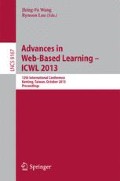Abstract
Use of blogging activities in university courses has been showed to improve the primary learning outcomes while additionally reinforcing important professional communication skills. In order to fully use the potential of blogging lack of students’ motivation to fully engage in the process may pose a major obstacle. It is not sufficient just to publish a few blog articles; instead, following the classmates’ blogs and active participation in the discussions is vital to achieve desired results. In this paper we show that incorporating well organized peer review rounds into the process significantly increased students’ participation, and in addition the benefits of such an exercise were perceived positively by the students.
Access this chapter
Tax calculation will be finalised at checkout
Purchases are for personal use only
Preview
Unable to display preview. Download preview PDF.
References
Bejdová, V., Kubincová, Z., Homola, M.: Blogging activities with peer-assessment in university courses. In: ICTE 2013. Ostravská univerzita v Ostravě (2013)
von Glasersfeld, E.: Radical Constructivism. A Way of Knowing and Learning. Falmer Press, London (1995)
Homola, M., Kubincová, Z.: Practising web design essentials by iterative blog development within a community portal. In: CSEDU 2009. INSTICC, Lisbon (2009)
Homola, M., Kubincová, Z.: Taking advantage of Web 2.0 in organized education (a survey). In: Procs. of ICL2009. Villach, Austria (2009)
Lin, S.S.J., Liu, E.Z.F., Yuan, S.M.: Web-based peer assessment: feedback for students with various thinking-styles. Journal of Computer Assisted Learning 17(4), 420–432 (2001)
Liu, E.Z.F., Lin, S.S.J., Chiu, C.H., Yuan, S.M.: Web-based peer review: the learner as both adapter and reviewer. IEEE Transactions on Education 44(3), 246–251 (2001)
Mosel, S.: Self directed learning with personal publishing and microcontent. In: Microlearning 2005. Insbruck University Press (2005)
Owen, M., Grant, L., Sayers, S., Facer, K.: Opening education: Social software and learning. Futurelab, Bristol (2006)
Papert, S., Harrel, I.: Constructionism: research reports and essays 1985 - 1990 by the Epistemology and Learning Research Group, pp. 1985–1990. Albex Publishing Corporation, Norwood (1991)
Popescu, E.: Students’ acceptance of Web 2.0 technologies in higher education: Findings from a survey in a romanian university. In: Procs. of DEXA 2012 (2010)
Popescu, E., Manafu, L.: Repurposing a wiki for collaborative learning-pedagogical and technical view. In: System Theory, Control, and Computing, pp. 1–6. IEEE (2011)
Razmerita, L., Kirchner, K., Sudzina, F.: Personal knowledge management: The role of Web 2.0 tools for managing knowledge at individual and organisational levels. Online Information Review 33(6), 1021–1039 (2009)
Siemens, G.: Connectivism: A learning theory for the digital age. International Journal of Instructional Technology & Distance Learning 2(1) (2005)
Sterbini, A., Temperini, M.: Dealing with open-answer questions in a peer-assessment environment. In: Popescu, E., Li, Q., Klamma, R., Leung, H., Specht, M. (eds.) ICWL 2012. LNCS, vol. 7558, pp. 240–248. Springer, Heidelberg (2012)
Wu, W.S.: The effect of blog peer review and teacher feedback on the revisions of EFL writers. Journal of Education and Foreign Languages and Literature 3(2), 125–138 (2006)
Author information
Authors and Affiliations
Editor information
Editors and Affiliations
Rights and permissions
Copyright information
© 2013 Springer-Verlag Berlin Heidelberg
About this paper
Cite this paper
Kubincová, Z., Homola, M., Bejdová, V. (2013). Motivational Effect of Peer Review in Blog-Based Activities. In: Wang, JF., Lau, R. (eds) Advances in Web-Based Learning – ICWL 2013. ICWL 2013. Lecture Notes in Computer Science, vol 8167. Springer, Berlin, Heidelberg. https://doi.org/10.1007/978-3-642-41175-5_20
Download citation
DOI: https://doi.org/10.1007/978-3-642-41175-5_20
Publisher Name: Springer, Berlin, Heidelberg
Print ISBN: 978-3-642-41174-8
Online ISBN: 978-3-642-41175-5
eBook Packages: Computer ScienceComputer Science (R0)

